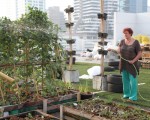
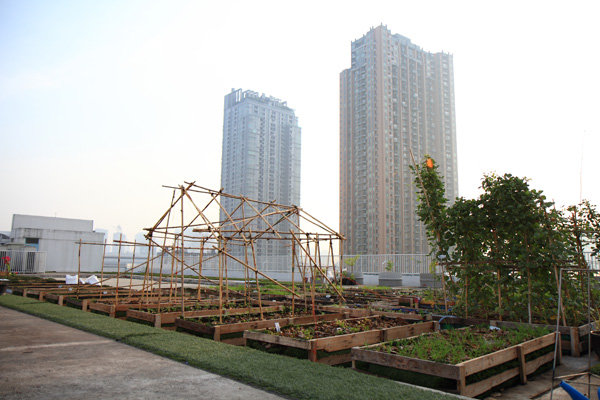
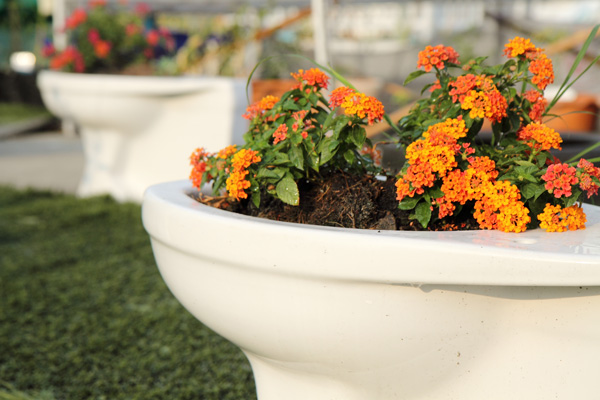
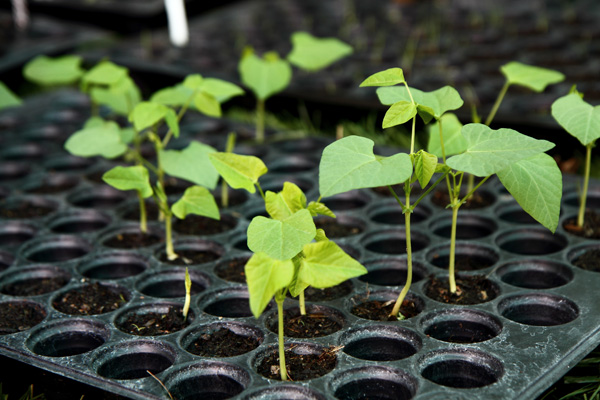
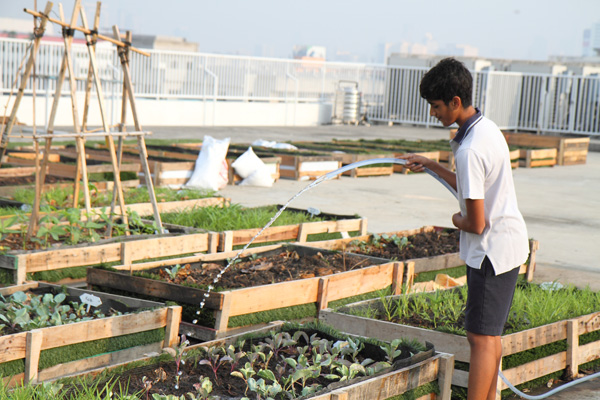
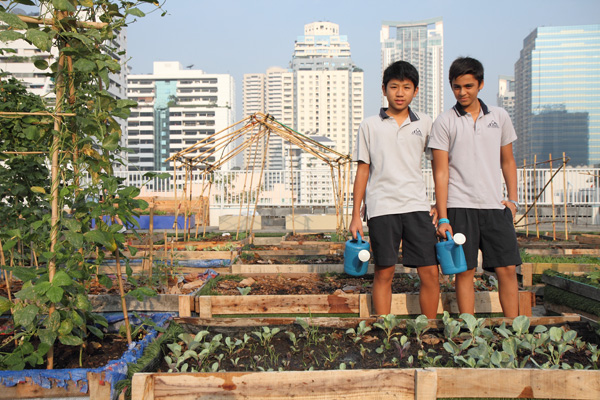
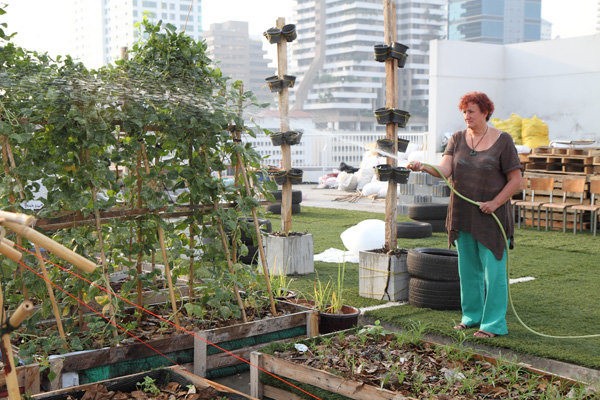
Written by Jamie Sriya, Year 10 NIST student
In the modern world and culture, the words "eco-friendly" and "green" are not only commonplace; they are a necessity for any institution claiming to be sustainable or environmentally aware. Schools are not exempt from this principle, and many worldwide have taken steps to improve their connection to the environment. To this extent, many schools have set up garden plots and planted trees, and these steps do greatly contribute to the ambience of any school.
The GreeNIST team from the NIST International School in Bangkok has taken a further step. They have adapted the principles of gardening for the urban jungle, and have set up a garden on top of their recently constructed secondary building. This roof-top garden, also lovingly referred to as a ‘farm’, has since made steady progress on solid roots.
The project started with a rag-tag team of NIST students and the goal to invigorate an unused area with life, as well as to create healthy snacks for students attending the school. It is the school’s response to the sustainability crisis that the modern world must confront; a response some would argue as a responsibility for all to take.
In order to create a successful garden, one must start small. A few seeds and pots and one has the ‘roots’ of a garden. With some sweat and spare wood one can create beds. Add soil and one has a platform to ‘plot’ his or her growth. Plant the seedlings, rinse and repeat. After a period of maintenance, one may be able to enjoy the ‘fruits’ (or vegetables) of his or her creation. The GreeNIST team recommends morning glory and beans, but yields will vary from garden to garden.
Although the project is student-run, there was a lot of outside support that greatly assisted the team's efforts. The green thumbs of Laksi Plaza gave the NIST team much needed advice on the intricacies of running a garden. Meechai Viravaidya, a well-known advocate and contributor to family planning, runs a garden alongside his educational program and school in Pattaya, and a visit to him gave further insight into garden management, especially into the financial aspects of the matter. In March, the team was visited by the people of Raitong Organics Farm, who arrived with more constructive feedback along with coveted heirloom seeds to kick-start the next batch.
The wood is recycled and free, but soil and coconut husk is not cheap. To overcome this vital hurdle, the NIST Development bank provided the team with 35,000 baht in funding, on the grounds that the project is a contribution to the entire school community. With these funds, the team aims to purchase the needed soil, as well as invest in the garden’s infrastructure, such as a permanent plant nursery and some shades to filter out the scorching Bangkok sun.
Now the GreeNIST project has ‘blossomed’ into a full-fledged operation, requiring daily maintenance and funds to maintain. Reception from the students has been very positive and there is no shortage of volunteers ready to tend to the garden leaves. The entire operation now includes a nursery, several compost bins, a worm farm, a large hydroponics unit, toilet plant pots, as well as many rows of farm beds. Plant species include morning glory, kale, beans, carrots, tomatoes, lettuces, and chillies. The team has also offered some of its produce for sale, as well as donated some healthy vegetables to the NIST staff rooms.
Looking to the future, the GreeNIST team hopes that the project will teach them important lessons not only in horticulture, but also in other fields such as design and finance, whilst also providing the school with a reliable and sustainable source of edible and organic plant matter to fuel the brains of ever-learning students.
1313
views

Royal Thai Embassy hosted Fulbright Association Reception on 22 November 2013
นายวิชาวัฒน์ อิศรภักดี เอกอัครราชทูตไทยประจำสหรัฐอเมริกา เป็...

Silicon Valley start-up accelerator expands to Thailand
The Founder Institute, a Silicon Valley-based technology sta...

Facebook Chat What's the Plus in Erasmus+?
On Monday 9 December the European Commission will be hostin...

Thai firms to invest $2 billion in solar power
Thailand is poised for a solar energy boom as private compan...

Thailand extradites five drug suspects to the United States
Thai authorities extradited five suspected international dru...

Second Round of Programme Representative Elections
If you missed the opportunity to nominate yourself for the P...

Update on the Elections for Programme Representatives!
Check out the first Programme Representatives and the ongoin...

เรียนฟรี กับกิจกรรม styling your space ที่ dii school
Interior Decorator Stylist Workshop สำหรับท่านที่สนใจอาชีพ ...

Board of Trade joins with fishing groups to fight labor abuse
Thailand’s Board of Trade has come on board with eight fishi...

University of Leicester มอบทุนการศึกษาในระดับปริญญาเอก สาขาวิศวกรรมศาสตร์ ที่ประเทศอังกฤษ
สวัสดีจ้าเพื่อน ๆ วันนี้ก็มาชมข่าวเกี่ยวกับทุนการศึกษาจากต่า...

University of Sussex มอบทุนการศึกษาในระดับปริญญาเอก ให้กับนักศึกษาต่างชาติ ปี 2557 นี้
ทุนการศึกษาถัดไปที่น่าสนใจของวันนี้ ที่ ScholarShip.in.th นำ...

20ทุนไทยพัฒน์ รัฐบาลให้ไปเรียนต่อต่างประเทศ ระดับปริญญาโท-เอก
สำนักงาน ก.พ. ได้รับพระมหากรุณาธิคุณจากพระบาทสมเด็จพระเจ้าอย...

ทุนมูลนิธิการศึกษาไทย-อเมริกัน (ฟุลไบรท์) ประจำภาคฤดูร้อน 2557
สถานทูตอเมริกันประจำประเทศไทย ร่วมกับมูลนิธิการศึกษาไทย-อเมร...

University of Strathclyde มอบทุนการศึกษาในระดับปริญญาตรี ให้กับนักศึกษาชาวต่างชาติ ในทุก ๆ สาขาวิชา
มาชมทุนการศึกษาต่อไปของวันนี้ ScholarShip.in.th นำมาฝากเพื่อ...

QBM มอบทุนปริญญาเอกเต็มจำนวน ศึกษาต่อประเทศเยอรมนี
The Graduate School of Quantitative Biosciences Munich (QBM)...

ผู้ช่วยเจ้าอาวาสวัดบวรฯ เผย "พระเกศา-พระโลหิต" พระสังฆราชกลายเป็นพระธาตุ
เมื่อวันที่ 10 ธันวาคม ที่วัดบวรนิเวศวิหาร พระราชรัตนมงคล ...




















